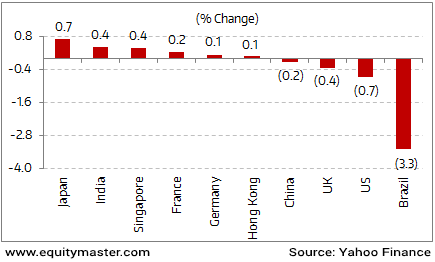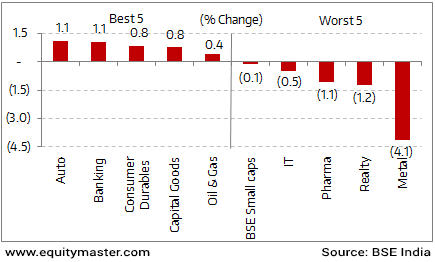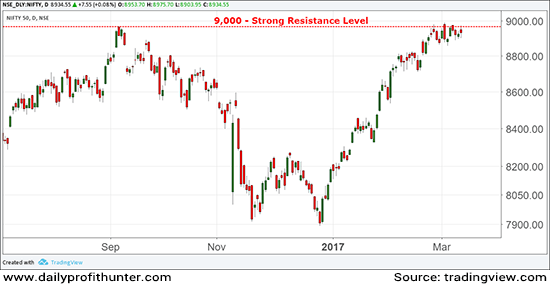- Home
- Todays Market
- Indian Stock Market News March 11, 2017
Global Stock Markets Remain Range Bound Sat, 11 Mar RoundUp
Most of the global financial markets ended the week on a flat note. The Brazilian index registered a 3.3% drop over the week, making it the top loser. Most of the global indices ended the week on a flattish note as they awaited cues from the US financial markets amid an impeding rate hike by the US Federal Reserve. European financial markets closed marginally positive as market participants managed to eke out gains late in the week, digesting strong US jobs growth data. Market participants in global markets remained cautious as a probable rate hike by US Federal Reserve was priced in the global indices.
US financial Markets (down 0.5%) snapped their four-week winning streak and ended marginally lower as participants were already looking ahead for the probable interest rate hike in the US Fed meet next week. Trump is looking forward to lower the tax burden on corporates. The Fed is scheduled to meet next week with most market participants expecting the central bank to tighten U.S. monetary policy. According to the CME Group's FedWatch tool, market expectations for a March rate hike stood at 93 percent.
Among developed economies, all European indices closed on a slightly weaker note in contrast to the rally earlier in the week. The UK indices closed the week down by 0.4%, while the German and French indices ended the week on a flattish note with gains of 0.1% and 0.2% respectively.
Back home, the BSE-Sensex ended in green and was up 0.4%. The week started on a positive note with the Indian indices hitting their respective 52-week highs earlier in the week. However, the early momentum was lost amid caution ahead of the assembly election results in five Indian states.
Key World Markets During the Week

On the sectoral indices front, auto sector and banking sector stocks led the gainers this week. On the other hand, stocks from realty sector, metals sector, and <>pharma sector witnessed maximum selling pressure.
BSE Indices During the Week

Now let us discuss some key economic and industry developments during the week gone by
In news about the economy. Global rating agency Fitch, in a report said the Indian economy will grow by 7.1% in the current fiscal before stepping up to 7.7% in the next two financial years.
The US-based agency, however, termed the 7% GDP growth for the October-December quarter as "surprising", a tad lower than 7.4% in the previous quarter.
According to the report, the GDP growth number is surprising as real activity data released since notebandi pointed to weak consumption and services activity because these transactions are cash-intensive. By contrast, official data suggest that private consumption was strong in the fourth quarter of 2016, although services output growth moderated quite substantially.
On this discrepancy, Fitch said it could be the inability of official data to capture the negative effects of notebandi on the informal sector.
Foreign Direct Investment (FDI) into the country's services sector increased by 77.6% to US$ 7.5 billion during April- December 2016-17 supported by government's various initiatives to improve ease of doing business, as compared to US$ 4.3 billion in the same period last year. Moreover, the overall foreign inflows in the country increased by 22% to US$ 35.8 billion during April-December 2016-17.
Indian services sector, which includes banking, insurance, R&D, outsourcing, courier and technology testing, represents over 60% share in the country's GDP and accounts for 17% of total foreign investment inflows. The Commerce and Industry Ministry is also considering relaxing FDI norms in certain sectors including retail to further boost inflows.
The other sectors where inflows recorded growth during the nine-month period of 2016-17 were telecom, which saw an inflow of US$5.54 billion, trading US$2 billion, computer software and hardware US$1.81 billion and automobile at US$1.45 billion.
FDI is considered crucial for economic development of a country and to attract maximum FDI into the country, the government has been relaxing the foreign investment norms in various sectors.
Moving on to the news from the pharma sector. India's National Pharmaceutical Pricing Authority (NPPA) announced major price cuts for certain cancer drugs, up to 86% in some cases. This was the latest in a series of government price cuts that has reduced the costs of around 1,450 drugs since late 2016.The highest reduction of 86% was in the price of AstraZeneca Pharma India's Iressa. It now costs Rs 3,977 from Rs 29,259 earlier. The price of Grafeel, manufactured by Dr Reddy's laboratories, was slashed by 41%. The company's Levin drug also saw a 25% reduction in its cost.Moreover, the regulator announced that it had slashed the prices of drugs to treat diabetes, as well. Since March 2016, the prices of these drugs were lowered by 10% to 42%.As per the NPPA, the downward price revisions were held for brands across pharma companies Dr Reddy's Lab, Abbot Healthcare, Micro Labs, Dabur India, HYPERLINK "https://www.equitymaster.com/result.asp?symbol=LUPL&name=LUPIN-LTD-Stock-Quote-Chart&utm_source=TM&utm_medium=website&utm_campaign=MCOM&utm_content=market-commentary" \t "_blank" Lupin and others.
In news from the banking sector. The government with a view to make public sector banks (PSBs) more accountable and improve performance, plans to introduce stricter recapitalization norms.
Recapitalization essentially is injecting funds to a back to help remedy serious liquidity issues or to steady the ship in case of large Non-Performing Assets (NPAs).
Hit by NPAs and losses, the Budget 2017 allocated Rs 100 billion to be injected the into PSBs in the next financial year to meet their capital requirements and bail them out from a financial mess.
Government is mulling keeping 50% of the total FY 18 recapitalization budget of Rs 100 billion linked to meeting certain performance criteria such as lowering bad loans, credit growth and the like. In the current fiscal only 25% of the total recapitalization fund was linked to performance.
The government also plans to bring in more disclosure rules and ask the banks to project their profits, income, recovery plans, bad loan ratio and other plans to raise funds from the markets.
During the April - September, PSBs' gross NPAs stood at over Rs 5,895 billion which is about 11.8% of the bank's gross advances.
Moving on to the FMCG Sector. FMCG industry has a potential to grow by more than 15% over the next 2-3 years if players in the sector focus on improving brand penetration.
The FMCG industry has witnessed a slowdown for the past three years. The industry's growth rate compared to GDP has fallen to 0.8 from a historical ratio of 1.2. During the slowdown, FMCG companies scaled back growth-oriented investments and shifted focus to sustaining profits-all at the cost of the top line. The report noted that the industry has seen the growth rate accelerating in 2016 over the previous two years, with 18 of the 22 categories recording an uptick, driven by rural markets. Last year, the FMCG industry grew at 9% till October and rural growth was 1.7 times the urban.According to India Brand Equity Foundation, the FMCG sector in rural and semi-urban India is estimated to cross US$ 100 billion by 2025. The rural FMCG market is expected to expand at a CAGR of 17.41% to US$ 100 billion during 2009-25.Rural FMCG market accounts for 40% of the overall FMCG market in India, in revenue terms. Rural areas also would be the major driver for FMCG, as growth continues to be high in these regions.
In news from information technology stocks. The US government announced that in order to clear the backlog of pending visa applications, it would temporarily suspend the 'premium processing' of H-1B visas from April 3.
By paying an additional premium of US$1,225, companies could get an H-1B application processed within 15 days, whereas a standard process takes 3-6 months. The temporary suspension of the fast-track processing of the H-1B visas, widely used by the Indian IT industry may last six months.
IT industry body- National Association of Software and Services Companies (Nasscom) agreed the suspension would create some process delays for the companies but does not see it as a significant impediment.
The suspension comes considering India pressing for a fair and rational approach on the issue from a trade and business perspective. As per the reports, this move could impact companies wishing to send employees to the US on H-1B for projects on an urgent basis.
In the past few weeks, there have been proposals to overhaul the popular H-1B visa regime through various legislations which have added to the worries of the Indian IT sector. The sector is already battling slower growth, currency fluctuation and cautious client spending. The US accounts for over 60% of the Indian IT export revenues.
Movers and Shakers During the Week
| Company | 03-Mar-17 | 10-Mar-17 | Change | 52-wk High/Low |
|---|---|---|---|---|
| Top Gainers During the Week (BSE Group A) | ||||
| Gujarat Flouro | 521 | 599 | 15.0% | 667/451 |
| Dish TV | 94 | 104 | 9.9% | 110/77 |
| Oracle Financial Services | 3,638 | 3,885 | 6.8% | 4,089/2,796 |
| Shriram Transport Fin. | 899 | 957 | 6.5% | 1,325/778 |
| Housing Dev. Infra | 68 | 72 | 6.3% | 109/52 |
| Top Losers During the Week (BSE Group A) | ||||
| MMTC Ltd | 64 | 58 | -8.6% | 74/34 |
| Vedanta Ltd | 271 | 248 | -8.3% | 275/85 |
| Hindustan Zinc | 310 | 285 | -8.2% | 333/158 |
| Apollo Hospitals | 1,316 | 1,208 | -8.2% | 1,443/1,111 |
| Bhushan Steel | 58 | 54 | -7.7% | 64/34 |
Some of the key corporate developments in the week gone by
Tata motors and Europe's largest car maker Volkswagen Group (VW) signed a Memorandum of Understanding, on the sidelines of the 87th Geneva International Motor Show to explore a possible joint technical collaboration or joint venture on vehicle architecture, engines and component sourcing.
Tata is keen to use VW's electrical architecture in its AMP products; this is understood to be far superior to Tata's own electrical system, and cost-effective to boot. Tata will take the lead on engine development as VW's powertrains, which have a low level of localization, are proving to be too expensive, especially for the Indian market.
Tata Motors has been relying on JLR's dividends to run the show, whereas the passenger vehicle division of the standalone entity has been for long subsidized by the truck division.
The sentiments also remained optimistic as the company's subsidiary - Jaguar Land Rover (JLR) has sealed an agreement with EDF Energy to buy all its electricity from renewable sources up to March 2020
In news from the IPO space, the initial public offering (IPO) of Avenue Supermarts Ltd, which runs the D-Mart supermarket chain, opened to robust subscription on Wednesday with investors bidding to get an allotment of the hot stock. The IPO saw robust investor demand and was oversubscribed 103.72 times by the close of markets on Friday. The supermarket operator was selling shares in a range of Rs 295-299 a share in an offer that closed on Friday.
The issue, worth Rs 18.7 billion, opened for subscription on Wednesday and closed on 10 March. The company is divesting 10% of its total equity shares. Avenue plans to use Rs 10.8 billion to repay debt and Rs 3 billion to purchase and build new stores.
The strong demand for the IPO can be attributed to the fact that the company is one of the most profitable retailers in the country, and posted a Rs 3 billion profit after tax on revenues of Rs 88 billion in fiscal 2017, until December 2016. Meanwhile, the IPO of Radio City FM operator Music Broadcast Ltd was oversubscribed 39.3 times on Wednesday, the last day of the offering. The issue had opened on 6 March.
In news from stocks in the pharma sector. Pharma stocks were down by over 1.1% this week. The US Food and Drug Administration (USFDA) has made 13 observations relating to deviation from good manufacturing practices at
Notably, Dr Reddy's had received a warning letter from the USFDA with regard to this facility in November 2015. After the commitments made by the company as part of its response to the warning letter were completed, a re-audit of the facility was scheduled for the first quarter of 2017. Recently, the company also got three observations from USFDA for its Miryalaguda active pharmaceutical ingredient (API) plant (subscription required) relating to violation of norms. The US contributes about half of the company's sales and has been under pressure owing to lack of new approvals and erosion of the base business.
Cipla Ltd through its wholly owned subsidiary Inyanga Trading 386 Proprietary (Inyanga), plans on divesting its animal health business in South Africa and Sub-Saharan Africa.
Under the agreements, Cipla will divest its 100% stake in Cipla Agrimed Proprietary (Cipla Agrimed), South Africa and Cipla Vet Proprietary (Cipla Vet), South Africa. The total consideration of transaction would be ZAR 375 million with potential revision linked to FY2017 performance along with customary adjustment (within the price band of R250m and R500m) in relation working capital and net debt/cash adjustments (Subscription Required).
Cipla Vet operates in the companion animal segment with sales primarily to wholesalers. Cipla Vet has a strong presence in the South African market, with leading positions in Proton Pump Inhibitors, Non-steroidal Anti-inflammatory Drugs (NSAIDs) and supplements.
Moving on to news from stocks in banking sector. Punjab National Bank (PNB) will put on sale four bad assets worth Rs 2.95 billion in a move to shed non-performing assets from its books.
Reportedly, the bank has identified assets worth Rs 18 billion that will be sold by month-end to recover bad loans. The reserve price has been fixed at Rs 1.95 billion on cash basis while on security receipt (SR) basis, it is Rs 2.16 billion.
The highest NPA of Rs 1.12 billion belongs to Ahmednagar-based loss making Tilaknagar Industries. Other accounts include Rs 1 billion from Mumbai-based Om Shiv Estate; Rs 0.56 billion from Bilcare Ltd and Rs 0.26 billion from Anand Distilleries.
Selling of bad loans to assets reconstruction companies, non-banking financial companies, other banks or financial institutions is pertinent for PNB whose gross non-performing assets (NPAs) stood Rs 556.27 billion as on 31 December 2016. In FY 2015-16, PNB posted net loss of Rs 39.74 billion due to high level of stressed assets as well as stringent RBI rules that required higher allocation to cover bad loans.
Notably, the Indian banking system reported the worst NPA levels among Asian economies in 2015. Vivek Kaul has written extensively about the mess in public sector banks in his Diaries.
After the mandatory asset quality review by the Reserve Bank of India in the latter half of FY16, PSBs were compelled to recognise risky restructured assets as bad loans and provide for them. This led to a significant amount of restructured advances getting converted into gross non-performing assets (NPAs) or bad loans
The metals sector finished down by over 4.1% this week. The downside was led by the shares of Coal India, and Hindustan Zinc plummeting over the week.
The company aims to use the plant to extract metals from the production waste, and to boost volumes. The company loses about 27,000 MT of metal per annum in this waste. Globally, the zinc-lead mining industries have been facing challenge towards recovery of metals from waste.
Hindustan Zinc has placed formal order to China non-ferrous metal industry's Foreign Engineering & Construction Co and it is expecting to commission the first zinc fumer plant at Chanderiya by the middle of 2018, the company said in a statement.
The plant, once operational will improve recovery of zinc from 96.8 % to 97.5% and would add about 3000 tonnes of zinc from just one smelter per annum. It will also increase lead production by about 4700 tonnes and silver by 33 tonnes per annum.
At present, Hindustan Zinc has an overall capacity to produce about 825,000 tonnes of Zinc, 180,000 tonnes of Lead and about 500 tonnes of Silver.
And here's an update from our friends at Daily Profit Hunter...
The Nifty 50 Index traded in a sideways range for the week. On Monday, it opened the session higher and gained 65 points to close at a new 52-week high. But it did not sustain up for long and slipped lower in the next two days. The index went up to challenge the 52-week high, but failed and slipped lower again. Finally, the index closed its weekly session with 0.4% gains. The Nifty traded in a tight range of 8,900 -8,970. The index has been facing strong resistance from 9,000 levels for the past three weeks, a level to watch. HYPERLINK "https://www.dailyprofithunter.com/markets/index.aspx?date=02/24/2017&story=714&title=Of-Feds-Bluff-Notebandi-Lies-and-Indias-Ecommerce-Ponzi-Scheme" You can read the detailed market update here...
Nifty 50 Index Trades near 52-Week High

For information on how to pick stocks that have the potential to deliver big returns, download our special report now!
Read the latest Market Commentary


Equitymaster requests your view! Post a comment on "Global Stock Markets Remain Range Bound". Click here!
Comments are moderated by Equitymaster, in accordance with the Terms of Use, and may not appear
on this article until they have been reviewed and deemed appropriate for posting.
In the meantime, you may want to share this article with your friends!